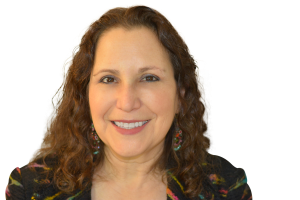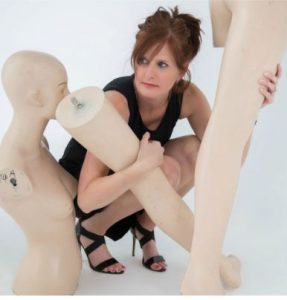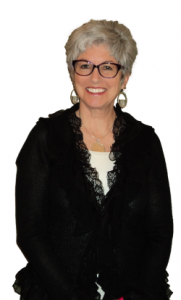2-Minute Tip: Identify Your Biggest Take Away
To deliver an effective presentation, first identify the biggest take away for the audience. If they remember only one thing, this is the thing it should be.
To figure that out, start by doing a brain dump on a piece of paper or whiteboard. Then go through all theses random ideas that are in someway related to your topic. What stands out? Which ideas are most important? What themes keep popping up?
As you do this, you'll likely discover the big idea for your talk. Once you have that, you can begin building everything else.
Post Tip Discussion: Meet Julia Wojnar
In the theater you have to know your part and how your role fits into the rest of the show. You have to know your lines and be rehearsed.
Speaking is similar. You have to know your purpose. Why are you speaking? What is your role in this meeting? What is the purpose of your talk in the larger event or conference? What are you meant to accomplish.
You have to be prepared and rehearsed to be effective. Unlike theater, you don't need to have your talk memorized word for word, but you do need to know your content.
That's what the prep work is all about.
Today's guest, Julia Wojnar comes from a theater background which helps her be an effective Public speaking trainer through her company, Unleash Your Presence.
In this conversation we talk about theater, working through nerves, identifying your purpose and speaking in different cultures.
Crazy 8s
One reason we get anxious before speaking is that our bodies don't really know how to deal with it. Evolutionarily, we are not optimized for standing in front of a group of other human animals and having the focus on us. Our fight or flight instinct kicks in. Adrenaline pumps. Muscles tense. Secondary biological processes may shut down. Muscles tense to spring into action and survive.
But it's all unnecessary. There is no threat to our lives. We're not about to be kicked out of the tribe. We need to rechannel that energy and deal with it.
Pradeepa Narayanaswamy recommended changing your language. Don't tell yourself you're anxious or nervous; tell yourself -- and others -- you're excited. And it's great insight because excitement and anxiety often feature similar physiological symptoms.
Julia offers another great way to deal with the anxiety -- the Crazy 8s (though it could use a less ableist name).
This is exercise comes from Julia's theater background where it can be a valuable warmup exercise for actors as they burn off their excess energy and get ready to wow the audience.
Take a look at the video below to learn more.
[embed]https://www.youtube.com/watch?v=NANGMbz5-Gk[/embed]
Billy Mays
I mentioned Billy Mays in this episode. If you're not familiar with him, Billy Mays was the quintessential TV pitchman of the 90s and 2000s. He's the reason so many people buy OxyClean, KaBoom, and other products.
Here is one of his videos:
[embed]https://www.youtube.com/watch?v=2PU8ZxQj7eE[/embed]
Bio
 Julia Wojnar is the Founder of Unleash Your Presence where she develops professionals’ resilience, speaking, and communication skills to tackle tough decisions and express their ideas clearly and confidently.
Julia Wojnar is the Founder of Unleash Your Presence where she develops professionals’ resilience, speaking, and communication skills to tackle tough decisions and express their ideas clearly and confidently.
She has honed her own speaking skills with over fifteen years of experience on stage speaking and performing, in addition to her formal training in Communications from Ithaca College.
She has been featured on The Huffington Post, Thrive Global, Hello Fearless, Grant Cardone’s Whatever It Takes Network, Savvy Central Radio (a syndicate of iHeartRadio), and The Wealth Standard Podcast, among others.
Nowadays, she speaks and delivers live and virtual trainings to help her clients bridge the gap between their brilliant idea and their ability to communicate it powerfully.
Promotions
Julia is making her Corporate Communications Check list available to listeners of 2-Minute Talk Tips. You can get that at by clicking here: http://2MinuteTalkTips.com/UYPTopTips
Julia also has a special deal for corporate managers right now.
If You're A Corporate Manager whose ready to "Set the Stage" to Lead Your Team with Clarity and Conviction…" then Julia has an online course which may be just what you need. And, she'll make Module 1 of this 8-Module series available - For FREE to the first 5 companies that qualify.
For more information and to see if you qualify, send us an email over at www.unleashyourpresence.com
Links
| Julia's Website | |
| Julia's Corporate Communications Checklist | |
| Julia on LinkedIn | |
| Julia on Facebook | |
| Julia on YouTube | |
| Crazy 8s | |
| Billy Mays for OxiClean | |
| Amy Lyle on 2-MinuteTalk Tips | |
| Pradeepa Narayanaswamy on 2-Minute Talk Tips |
Call To Action:
- Check out Julia's Corporate Communications Checklist at http://2MinuteTalkTips.com/UYPTopTips
- Check out the other resources Julia has over at http://UnleashYourPresence.com
- Subscribe to 2-MinuteTalkTips in your favorite podcast app for free so you never miss an episode
- Don't get best…get better.


 Geoff Babb’s first of two strokes abruptly pushed him into the world of disability. Today Geoff is the AdvenChairman of the Onward Project, which seeks to inspire, encourage, and enable people of all abilities to have active outdoor adventures.
Geoff Babb’s first of two strokes abruptly pushed him into the world of disability. Today Geoff is the AdvenChairman of the Onward Project, which seeks to inspire, encourage, and enable people of all abilities to have active outdoor adventures. Sandy Weiner, founder of Last First Date, is devoted to helping women over 40 achieve healthy, toe-curling love. An internationally known TEDx speaker, dating coach, author, and podcast host, Sandy specializes in helping women communicate effectively, set clear boundaries in relationships, and know their true worth. She believes a woman of value attracts her best partner.
Sandy Weiner, founder of Last First Date, is devoted to helping women over 40 achieve healthy, toe-curling love. An internationally known TEDx speaker, dating coach, author, and podcast host, Sandy specializes in helping women communicate effectively, set clear boundaries in relationships, and know their true worth. She believes a woman of value attracts her best partner.  Most people avoid talking about their most cringe-worthy moments but not our next guest, Amy Lyle. She has turned her own disasters into T
Most people avoid talking about their most cringe-worthy moments but not our next guest, Amy Lyle. She has turned her own disasters into T Erik Johnson enlisted in the Army in 1996. As a young Private, while stationed in Germany, he was involved in a car accident where he sustained second and third degree burns to over 20% of his body, most of which were on his arms and hands. He decided to become an Occupational Therapist because of the influence from the OT that treated his burns.
Erik Johnson enlisted in the Army in 1996. As a young Private, while stationed in Germany, he was involved in a car accident where he sustained second and third degree burns to over 20% of his body, most of which were on his arms and hands. He decided to become an Occupational Therapist because of the influence from the OT that treated his burns.

 54-year-old
54-year-old  David Erickson is a digital marketing veteran, principal of e-Strategy Media and producer and co-host of the Beyond Social Media Show. He is a frequent expert source for media coverage of digital marketing topics, having appeared on MSNBC and CBS and cited in such publications as USA Today, US News & World Report, Slate & Search Engine Watch.
David Erickson is a digital marketing veteran, principal of e-Strategy Media and producer and co-host of the Beyond Social Media Show. He is a frequent expert source for media coverage of digital marketing topics, having appeared on MSNBC and CBS and cited in such publications as USA Today, US News & World Report, Slate & Search Engine Watch.
 Robin came into the world able-bodied, but had a birth defect that resulted in a spinal aneurysm. After scheduling surgery to fix the aneurysm, she learned she was pregnant. During the surgery, she acquired a spinal cord injury that resulted in partial paralysis. She continues to recover while living in San Francisco and helping folks with disabilities navigate the world of sex.
Robin came into the world able-bodied, but had a birth defect that resulted in a spinal aneurysm. After scheduling surgery to fix the aneurysm, she learned she was pregnant. During the surgery, she acquired a spinal cord injury that resulted in partial paralysis. She continues to recover while living in San Francisco and helping folks with disabilities navigate the world of sex. Born and raised in southern Illinois, Jayne's Midwestern roots still influence her friendly, approachable demeanor, which can disarm and delight at the same time. Hearing an occasional “Well, hell’s bells!” or “I’m on that like green on grass, white on rice, and a duck on a June bug!” is not uncommon. At the same time, Jayne offer deeply insightful observations, sound solutions, and a quick wit.
Born and raised in southern Illinois, Jayne's Midwestern roots still influence her friendly, approachable demeanor, which can disarm and delight at the same time. Hearing an occasional “Well, hell’s bells!” or “I’m on that like green on grass, white on rice, and a duck on a June bug!” is not uncommon. At the same time, Jayne offer deeply insightful observations, sound solutions, and a quick wit.